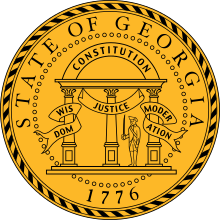Rufus Bullock

Rufus Brown Bullock (March 28, 1834 – April 27, 1907) was an American Republican politician and Georgia businessman. During the Reconstruction Era he called for equal economic opportunity[1] and political rights for blacks and whites in Georgia. He also promoted public education for both races, and encouraged railroads, banks, and industrial development. He was unpopular among whites during his governorship, but for three decades afterwards he was an esteemed private citizen.
Early life
Bullock was born in Bethlehem, New York, and moved to Augusta, Georgia, in 1857 for his job with the telegraph company Adams Express.[2]
Political Life
Bullock served as the 46th Governor of Georgia from 1868 to 1871 during Reconstruction and was the first Republican governor of Georgia. After Georgia ratified the Fourteenth Amendment to the Constitution, the Omnibus Act declared that states were entitled to representation in Congress as one of the states of the Union. Georgia again lost the right to representation in Congress because the General Assembly expelled twenty-eight black members and prevented blacks from voting in the 1868 presidential election.[3] In response to an appeal from Bullock, Georgia was again placed under military rule as part of the Georgia Act of December 22, 1869.[4] This made Bullock a hated political figure. After various allegations of scandal and ridicule,[5] in 1871 he was obliged by the Ku Klux Klan to resign the governorship.[6] He was succeeded by Republican State Senate president Benjamin Conley, who served as Governor for the two remaining months of the term to which Bullock had been elected. Conley was succeeded by James M. Smith, a Democrat, and no Republican would serve as governor of Georgia again until Sonny Perdue in 2003.
Postbellum Life
Bullock served as president of the Macon and Augusta Railroad in 1867, and established the Augusta First National Bank. He later became president of the Atlanta Chamber of Commerce, and in 1895 served as master of ceremonies for the Cotton States and International Exposition.[7] Bullock introduced the speaker, Booker T. Washington,[8] who gave his famous "Atlanta Compromise" speech.
Death and Legacy
Bullock died in Albion, New York, in 1907 and was buried in Mt. Albion Cemetery nearby.[9]
Bullock has had both detractors and admirers. He remains a controversial figure in Georgia state history.
In Books
The novel Gone With the Wind, by native Georgian Margaret Mitchell, references the election of Rufus Bullock at the end of Part Four, calling it the end of a process of Northern subjugation of Georgia that had begun with Sherman's March to the Sea in 1864. In the novel, the Republicans win the election, utilizing voter fraud with the help of their Negro (freed slaves) constituency.
References
- ↑ Hume, Richard L. (2008). Blacks, Carpetbaggers, and Scalawags : The Constitutional Conventions of Radical Reconstruction. Baton Rouge: Louisiana State University Press. p. 122. ISBN 9780807148341. Retrieved 3 June 2016.
- ↑ Usselman, Steven W. (2002). Regulating Railroad Innovation : Business, Technology, and Politics in America, 1840-1920. London: Cambridge University Press. ISBN 9780521806367. Retrieved 16 June 2016.
- ↑ Smith, W. Calvin (1968). "The Reconstruction 'Triumph' of Rufus B. Bullock". The Georgia Historical Quarterly. 52 (4): 414. JSTOR 40578901.
- ↑ Stathis, Stephen W. (2014). Landmark Legislation, 1774-2012 : major U.S. acts and treaties (2nd ed.). Washington: CQ Press. p. 119. ISBN 9781452292304. Retrieved 3 June 2016.
- ↑ Baker, Bruce E.; Kelly, Brian (2013). After slavery : race, labor, and citizenship in the reconstruction South. Gainesville: University Press of Florida. p. 60. ISBN 9780813044774. Retrieved 3 June 2016.
- ↑ "Rufus Bullock" in New Georgia Encyclopedia.
- ↑ Harvey, Bruce G. (2014). World’s Fairs in a Southern Accent : Atlanta, Nashville, and Charleston, 1895–1902. Knoxville: University of Tennessee Press. p. 134. ISBN 9781572338654. Retrieved 3 June 2016.
- ↑ Perdue, Theda (2010). Race and the Atlanta Cotton States Exposition of 1895. Athens: University of Georgia Press. p. 7. ISBN 9780820342016. Retrieved 3 June 2016.
- ↑ Rufus Bullock at Find a Grave.
Further reading
- Entrepreneur for Equality: Governor Rufus Bullock, Commerce, and Race in Post-Civil War Georgia (1994), Russell Duncan, University of Georgia Press, ISBN 0-8203-1557-5.
External links
- Georgia State Archives Roster of State Governors.
- Georgia Governor's Gravesites Field Guide (1776-2003).
- 1834 March 28 article in This Day in Georgia History compiled by Ed Jackson and Charles Pou.
- National Governors Association page
| Political offices | ||
|---|---|---|
| Preceded by Charles J. Jenkins |
Governor of Georgia 1868–1871 |
Succeeded by Benjamin F. Conley |
